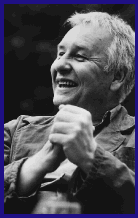
    |
 |
|
 |
Convocation tomorrowAbout 1,700 graduates from all four Faculties will receive their diplomas at Fall Convocation, scheduled for 10 a.m. tomorrow at Place-des-Arts. The winner of the Governor-General's Gold Medal for outstanding scholastic achievement is Gregory Huyer, PhD, now doing postdoctoral work in chemistry at Cambridge University in England. The valedictorian will be Catherine Mattes, a Métis scholar from Winnipeg who did her MA on Louis Riel. To read more about them, turn to page 7. Honorary doctorates will be awarded to Polish composer H.M. Gorecki and Finance Minister Paul Martin. |
Henryk Gorecki is one of the most renowned and respected composers of our time. He was born in 1933, in the town of Czernika, in Poland.
It was certainly a problematic time and place to enter life. The unprecedented violence of the First World War had replaced many old values with intolerant and combative ideologies, and Poland soon became embroiled in the conflict of these two giants. As a young boy, Gorecki had to experience first German, then Russian, occupation, which left him physically so weakened that his very survival was at stake.
In artistic matters, this was also a time marked by division and intolerance. The beginning of the century had witnessed fundamental challenges to the aesthetic and syntactic foundations of music. The universality of style that had ruled Western music for centuries had given way to a multiplicity of mutually exclusive styles. Many music lovers rejected this so-called modern music, and turned towards more comprehensible popular or historic music.
It was certainly not an auspicious environment for a young man to start his career, but right from the beginning, Henryk Gorecki proved to be stronger than his adverse surroundings. Fortunately, he received significant support from the Polish institutions of musical education that had nurtured the talents of Fredric Chopin and Carol Szymanowski.
As a young man, Gorecki surprised his teachers with the quality of his musical compositions. He became a master of complex compositional techniques and was accepted as an equal by the most prominent composers of his time. However, gradually and almost imperceptibly, his musical style moved towards greater simplicity. His 1963 composition Three Pieces in the Old Style marked the beginning of this evolution.
As a committed Catholic, he wrote many compositions based on sacred texts, some in honour of the Pope's visit to Poland, others in support of the Solidarity Movement.
Public acceptance of his music grew steadily, first in Poland and then on an international level, as a consequence of the 1989 performance in Germany of his Third Symphony. His music touched the hearts and minds of music lovers at all levels of sophistication.
The music of Henryk Gorecki represents the most positive aspects of the closing years of our century, as we try to heal the wounds inflicted by the violence and intolerance of our times. It will endure into the next millennium and inspire other composers.
The Faculty of Fine Arts has long nurtured close relations with institutions of art education in Poland. We consider Mr. Gorecki's acceptance of an honorary doctorate from Concordia University a source of pride and joy for the large community of Canadians of Polish descent. Through his work, he reflects our willingness not only to accept, but to embrace, our cultural and ethnic diversity.
- by Professor Wolfgang Bottenberg
Paul Martin, Canada's Minister of Finance and Liberal member of parliament for Lasalle-Émard, was born in Windsor, Ontario, in 1938 and educated at the Universities of Ottawa and Toronto, where he graduated in honours philosophy. He graduated from the University of Toronto Law School, and was called to the Ontario Bar in 1966.
His first working experience was as a merchant seaman on the Mackenzie River, in the High Arctic and on the Atlantic Ocean. He also gained some hands-on experience working as a "roustabout" in an Alberta oil field prior to donning a three-piece suit.
However, he has spent much of his business career in the boardroom, first with Power Corporation, and later as chair and CEO of Canada Steamship Lines. He has also served as a corporate director for seven major Canadian companies.
In 1982, Martin became a member of Concordia University's Board of Governors. In 1987, he was elected vice-chair of the Board, a post he held until December, 1988, when he was elected. However, he continued his association with the University as a member of the advisory board of Concordia's School of Community and Public Affairs until 1994.
As a member of the official opposition, Martin served as critic for a variety of economic and social portfolios, including environment and finance. He chaired the Liberal caucus committee on sustainable development and the Liberal task force on housing issues. Less than two years after his election to the House of Commons, he was a candidate for his party's leadership, finishing second among the five contenders.
Martin was instrumental in the formulation and development of the Liberal Party platform for the 1993 federal election, which brought the Liberals to power. He was appointed Minister of Finance, and was re-appointed to the post in 1997.
In addition to his professional responsibilities, Paul Martin has been active in a wide range of community and service organizations, serving on the boards of Amnesty International, the Centre for Research and Action on Race Relations and the Canadian Centre for Arms Control. He is also a founding director of the North-South Institute and the Canadian Council for Native Business.



